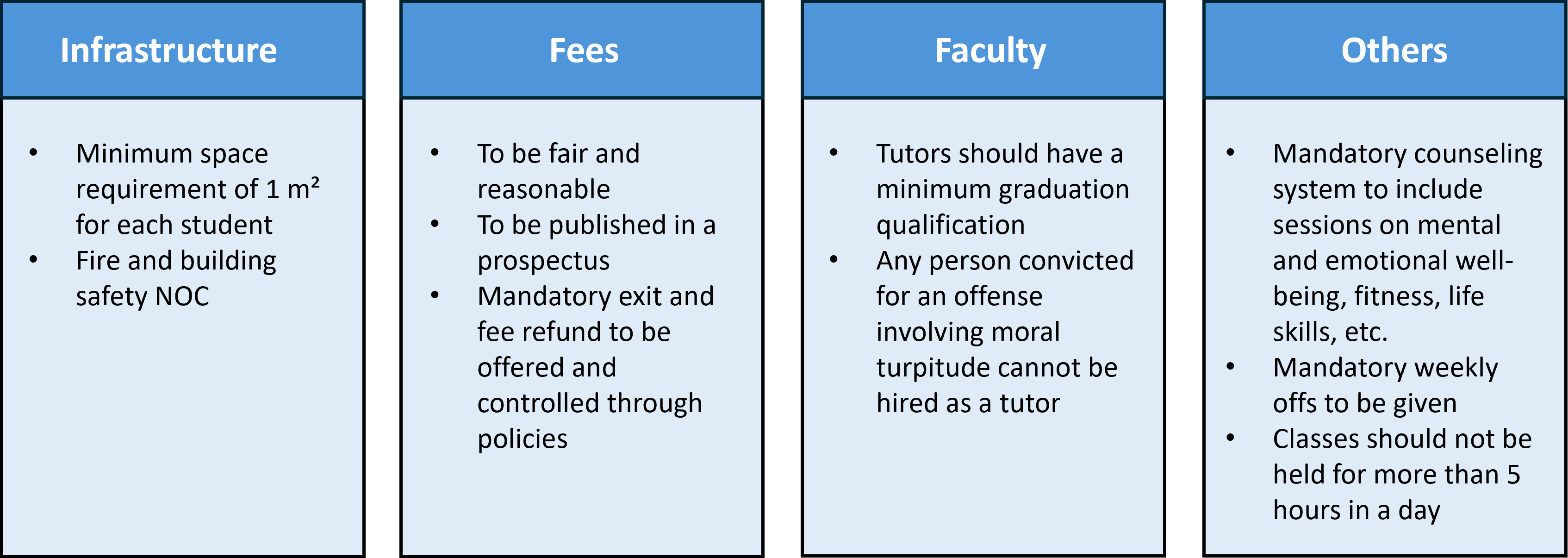The Private Coaching market in India has grown rapidly over the last decade. It recorded a market revenue of USD 7 billion in December 2022 and is projected to reach USD 16.16 billion by 2028. With about 250 million students in K-12, comprising almost 25% of the world’s school going students, India is one of the largest markets for the coaching industry.

Currently, the coaching industry in India is segmented by audience, product and mode of learning.

Although the private coaching sector is a major segment in the Indian education market both in terms of addressable market and revenue, it has largely remained unregulated. In this article, we have discussed two recent legislations that may potentially disrupt the coaching market - the Ministry of Education’s (MoE) Guidelines for Regulation of Coaching Centres (Coaching Guidelines) and the Central Consumer Protection Authority’s (CCPA) Draft Guidelines for Prevention of Misleading Advertisement in Coaching (Draft CCPA Guidelines).
Brewing in the Background: NEP 2020 and State Legislations
It is important to acknowledge that regulation of coaching centres has been brewing for a while. In 2020, National Education Policy (NEP) proposed to transform assessment patterns of students to reduce the need for coaching classes and eliminate the mushrooming coaching culture. In addition, states such as Karnataka (since 2001), Uttar Pradesh (since 2002), and Bihar (since 2010) have had state legislations regulating private coaching for several years preceding the release of NEP or Coaching Guidelines. Even though regulations have been around for over 15 years news reports suggest that on-ground implementation has been erratic.
As things stand today, there is indeed some regulation but considering the state of implementation, it may well be non-existent, which brings us to what’s new now.
MoE Guidelines for Regulating Coaching Centres 2024
In January 2024, following the lead from NEP, the Ministry of Education released Coaching Guidelines, which became the first central and major piece of regulation in this sector. These guidelines are likely to dramatically change the coaching landscape in India. Here’s why:
Applicability Threshold: Tuition, instruction or guidance in any branch of learning imparted to 50+ students (except counselling, sports, dance, theatre and creative activities) would now fall within the meaning of coaching.
Age Restriction: Students below 16 years of age or those who have not completed secondary school examination cannot be enrolled in a coaching centre.
Registration: Prior registration is required to run coaching centres.
Non-compliance under the Coaching Guidelines would expose the coaching centres to penalties upto INR 1,00,000 and/or cancellation of registrations.
If we look at the NEP, there are a number of problems that require solving when it comes to coaching centres. In these guidelines, however, the Government appears to be focused on solving the issue of student well-being. This is the central theme that underpins the Coaching Guidelines, key highlights being:

The above-mentioned controls on minimum space, teacher quality, hours of study and counselling push the goal of student well-being.
Unlike the regulated education market in India, these guidelines do not mandate a not-for-profit (NFP) model. It would seem that the Government has deliberately refrained from legislating in this regard. In fact, the Coaching Guidelines refer to the establishment or running of coaching centres by persons including ‘body corporates’. However, it is important to recognize that Coaching Guidelines are not enforceable as is and rather serve as model guidelines for state governments to adopt and enforce. This means that more regulation is possible and yet to come. This also means that such state regulations could potentially be stricter. States do have the power to add the NFP requirement and in fact states like Karnataka have already done so.
Another key takeaway is that although the guidelines do not explicitly spell-out applicability to online centres, coaching centres that operate in a hybrid mode will likely be regulated. This becomes important in light of the recent move by several edtech players to build an offline presence to derisk business. Whether the market will respond by reversal or reduction in this trend will be an interesting area to watch.
Draft CCPA Guidelines for Prevention of Misleading Advertisement in Coaching 2024
Following Ministry of Education’s footsteps, the CCPA has also issued the Draft CCPA Guidelines in February 2024, aimed at controlling aggressive advertising strategies adopted by coaching centres to lure students into enrolment. Key dos and don’ts under the Draft CCPA Guidelines are:
Prohibition of false claims regarding success rates, number of selections, ranking of students in competitive examinations.
Prohibition of exaggerated claims about faculty credentials and unsubstantiated guaranteeing of marks, admissions and jobs.
Compulsory disclaimers and disclosures which are conspicuously displayed in their advertisements.
Non-compliance under the Draft CCPA Guidelines is enforceable in accordance with the Consumer Protection Act 2019. This means penalties upto INR 50,00,000 and recourse for aggrieved students or consumers through disputes redressal commission for a speedier and efficacious resolution of the complaint, as opposed to approaching ordinary courts in India. Essentially, similar to the intent under the Coaching Guidelines, the focus of the Government is on rebalancing the coaching industry in favour of students and their well-being.
Is the Government Out to Catch the Coach?
It seems that the government is not out to catch the coach but simply coach the coach. Although legislative reforms imply checks on the commercialisation of coaching centres, the government has not taken a stance on for-profit versus not-for-profit in the private coaching sector - not yet anyway.
This means no brakes on growth, even though there may be some roadblocks in the shape of regulatory compliances to account for the interests of students.

